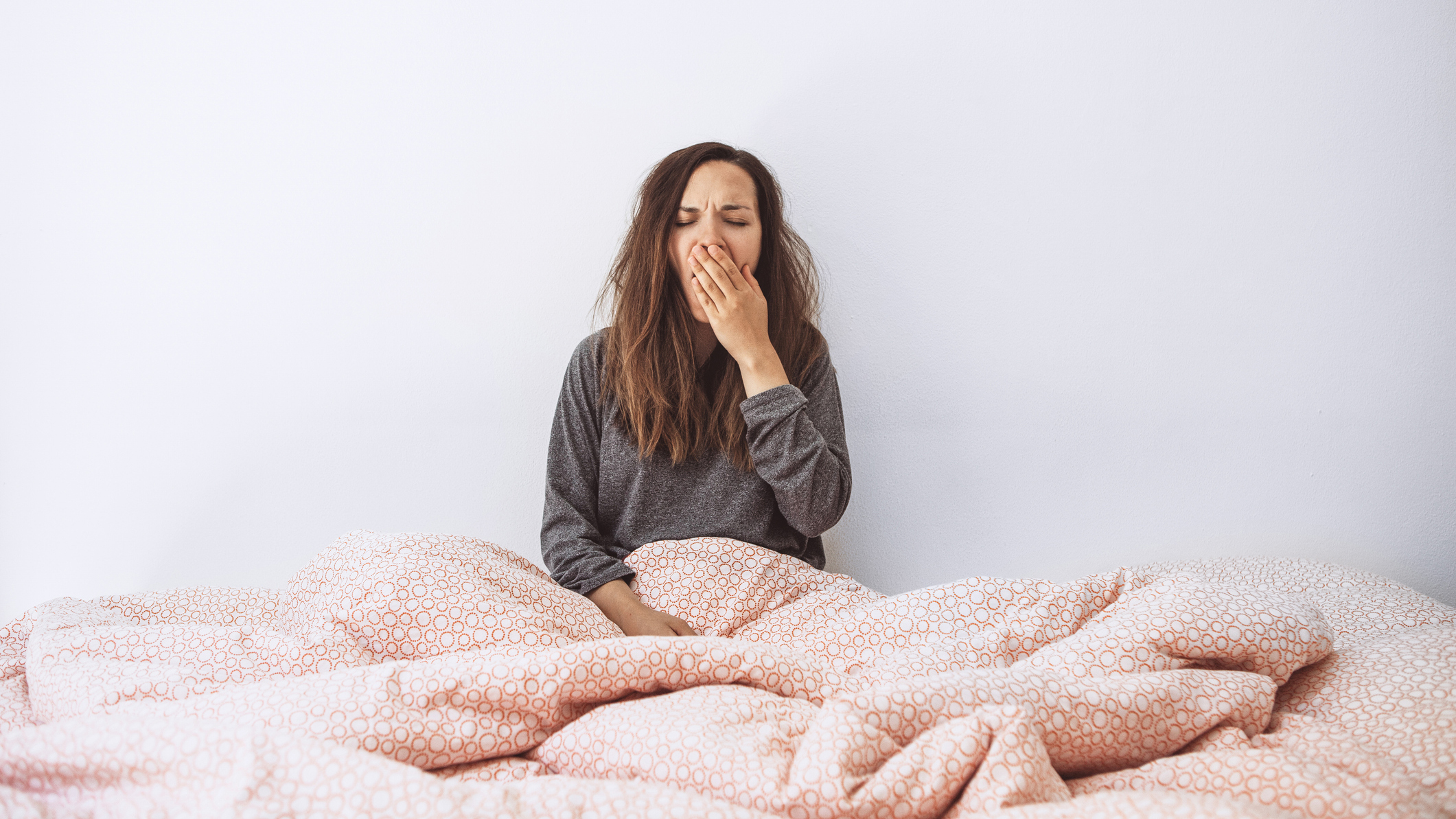These morning habits could be the reason you can't sleep at night — and what to do instead
How to fix your morning routine for better sleep at night

You may think your pre-bedtime routine is more important when it comes to bagging good quality than what you do first thing in the morning, and that's understandable. But experts now say your morning influences how well you sleep at night.
A recent poll commissioned by Naturepedic and conducted by Talker Research, found 68% of people "credit having a good day to getting a good night's sleep," and that 37% said they can tell what the mood of the day is going to be within just 10 minutes of waking up.
So, besides sleeping on the best mattress for your sleep style and body type and keeping your bedroom sleep-friendly, there are morning habits you can form (and ones you should kick) for better quality ZZZs come nighttime.
A good night's sleep starts in the morning
Practising healthy habits when you first wake up, such as exercising, managing stress and eating well, can set you up for better sleep at the end of the day.
Dr. Michael Gradisar, Head of Sleep Science at Sleep Cycle explains this is because of two "biological sleep systems".
"Sleep pressure and our circadian rhythm work together throughout the day and when we go to bed at night. And it all begins in the morning." he explains.
The key to resting well is regulating your circadian rhythm (aka your internal 24-hour clock) so your mind and body recognise when it is time to wind down for sleep and when it is time to be alert and energised.
Get instant access to breaking news, the hottest reviews, great deals and helpful tips.
"The morning is a great opportunity to be productive"
When your circadian hormone cycles are aligned, your body will produce sleep-inducing hormones like melatonin at night, helping you fall asleep quickly and suppress those hormones come morning, helping you feel awake.
Light, temperature, eating and exercising are all external factors that influence and synchronize the body's internal biological clock. So, managing your exposure to these external stimuli through the day, and especially around the time you wake up and fall asleep, can impact how well you rest.
7 morning habits that could be ruining your sleep & how to fix them fast
From blocking out light to downing a latte first thing, your morning habits might be unintentionally sabotaging your sleep. Here's what to watch out for and how fix your morning routine for better sleep...
1. Staying in the dark
Getting morning sunlight is a great way to kick-start your circadian clock as light tells your body to produce cortisol, boosting alertness. This means keeping your curtains closed in the morning can increase grogginess or prolong sleep inertia.
"A consistent wake-up time and exposure to bright light within the first 30 minutes of waking helps signal your body that it’s time to be alert, " says Dr. Gradisar.
He explains that the light "acts like the brake pedal, preventing our circadian rhythm from drifting too late."

WHAT TO DO INSTEAD: Get up and open your curtains as soon as your alarm sounds, or sleep with your blinds open so the sunrise can wake you naturally. Even better, you could get outdoors for a hit of vitamin D too, which is produced when sunlight hits our skin, and is also associated with sleeping well.
2. Delaying breakfast
Several studies have found healthy balanced diets are linked to healthy sleep. One study specifically found skipping breakfast and eating irregularly were strongly associated with poor sleep quality.
Literally breaking your overnight fast, a nutritious breakfast is a key part of a healthy diet. It replenishes glucose levels, provides energy and fires up your metabolism for the day, contributing to the regulation of your circadian clock.
Not only can skipping breakfast make you hangry by late morning, it also means the rest of your meal times are likely to be shifted later in the day, which can cause issues with sleep quality.
Eating late at night (particularly large meals) increases core body temperature and activates digestion — both of which can delay sleep onset and lead to more nighttime awakenings.
WHAT TO DO INSTEAD: Experts at Sleep Number recommend eating breakfast within one hour of waking and at a consistent time each day stabilize your biological clock and energy levels. Luckily, a lot of breakfast foods are also sleep-friendly. For example, oats, cereal and eggs are loaded with both magnesium and zinc, which are staples in healthy diets linked to better sleep.
3. Getting lost in your phone
What you do in the first few minutes of waking can have a huge influence over the tone you set for the day. Unsurprisingly, mindlessly scrolling through social media feeds and news sites isn’t always the best way to set the mood.
Social scientist Dr. Pamela Rutledge believes looking at your phone first thing can drain your mental energy before you get out of bed, leaving you unprepared for the day ahead.
"If we launch into the news, email, or social media, we use the cognitive energy from a good night’s sleep without direction or purpose," she says.
Your body's natural clock triggers a spike in cortisol upon waking, giving your body and mind energy. This means the morning is a great opportunity to be productive, and missing out on this natural energy window can cause stress later in the day when you’re trying to cram tasks in while running off lower fumes. This stress can negatively affect sleep.

WHAT TO DO INSTEAD: Take a mindful moment where you can set an intention for the day ahead. This way you start the day in a brighter mindset, are more likely to be productive and will be able to wind down easier when the evening comes.
4. Hitting snooze
The snooze button can be oh-so tempting when your alarm sounds early in the morning on a work day. But research from Amerisleep shows hitting the snooze button regularly can disrupt your internal clock.
Your body becomes confused when you're switching between waking up and dropping back off to sleep, and over time this can disrupt your circadian rhythm, meaning that it's harder to fall asleep and get quality rest, and that you're more likely to wake up tired.
WHAT TO DO INSTEAD: Cutting this habit comes down to sheer discipline — you'll have to resist hitting snooze and get up at your intended wake time. One piece of tech that can help is one of this year's best sunrise alarm clocks, which wake you up gradually with light. A calmer alternative to being jolted awake by an alarm, it may reduce your inclination to hit snooze!
5. Skipping movement
Exercise is great for sleep, and skipping your morning movement can mean you miss out on benefits to your body clock.
"Moving soon after waking can also help to stabilize your circadian rhythm," Dr. Gradisar explains.
Plus, exercise can improve your mood for the day thanks to the release of hormones like endorphins, dopamine and serotonin.
The more exercise you do, the more deep sleep you will have, according to neuroscientist, psychologist and sleep expert Dr. Lindsey Browning. However, the time you're active can make a difference.
Your body temperature and cortisol levels rise during exercise, which is great for boosting alertness and energy levels, but not conducive to peaceful sleep. That means leaving your exercise until later in the day might impact your ability to drop off.

WHAT TO DO INSTEAD: Get up and move early to boost cortisol levels and feel-good hormones. You'll feel alert and likely be in a better mood throughout the day, and it will help maintain your circadian rhythm to help you sleep better at night.
6. Drinking only coffee
There's no harm in a morning coffee. The caffeine hit can increase alertness and cognitive function to help you power through daily tasks. It's only problematic when you're replacing proper hydration with a latte or flat white.
Dehydration can cause headaches and cramps, and can increase snoring, which can all have a negative impact on your sleep later on.
Making sure you drink plenty of water alongside warm beverages in the morning helps you get ahead of hydration, and that, as well as continuing your water intake throughout the day, will aid you in getting better sleep at night.
WHAT TO DO INSTEAD: Keep a glass of water at your bedside so it's at hand to sip first thing in the morning before you pour a coffee.
7. Lounging in bed too long
A slow morning is needed sometimes to restore energy levels and give your body the rest it needs.
But if you regularly spend a lot of time in bed while awake, your brain will be less likely to associate it with sleep, meaning you may find it harder to switch off, and drift off, when you get under the covers at night.

WHAT TO DO INSTEAD: You'll need to be strict with yourself here, too. Make sure you get up and out of bed right away in the morning so your body and mind associates it only as the place to wind down for sleep.

Eve is a sleep tech product tester and writer at Tom's Guide, covering everything from smart beds and sleep trackers, to sleep earbuds and sunrise alarm clocks. Eve is a PPA-accredited journalist with an MA in Magazine Journalism, and has four years’ experience writing features and news. In her role as Sleep Tech Product Tester and Writer for Tom's Guide, Eve is constantly trying out and reviewing the latest sleep products from brands such as Apple, Garmin, Whoop, Hatch, Sleep Number, Eight Sleep, and Oura. A fitness enthusiast who completed the London Marathon earlier this year, Eve loves exploring the relationship between good sleep, overall health, and physical performance, and how great sleep tech can make that relationship even better.
You must confirm your public display name before commenting
Please logout and then login again, you will then be prompted to enter your display name.
 Club Benefits
Club Benefits





